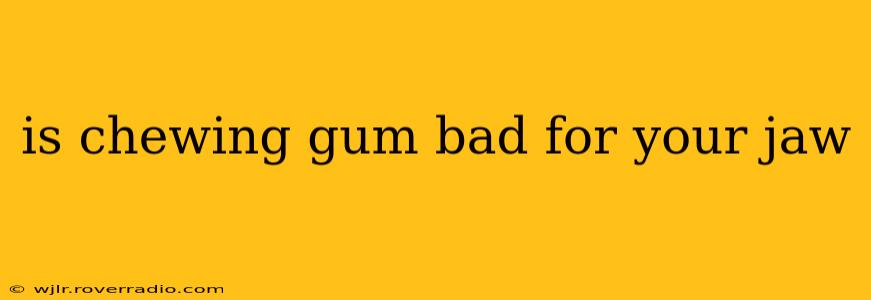Chewing gum is a popular pastime, enjoyed for its refreshing flavor and potential cognitive benefits. However, concerns often arise regarding its potential impact on jaw health. Is chewing gum truly detrimental to your jaw? The answer, like many things in health, is nuanced and depends on several factors. Let's delve into the research and explore the potential benefits and drawbacks.
Does Chewing Gum Cause TMJ?
This is a common question, and the short answer is: there's no definitive scientific consensus linking chewing gum directly to Temporomandibular Joint (TMJ) disorders. While excessive or forceful chewing can exacerbate existing TMJ problems, it's not considered a primary cause. For individuals already suffering from TMJ, chewing gum might worsen symptoms like pain and clicking in the jaw joint. However, for those without pre-existing conditions, the risk is likely minimal with moderate chewing.
Can Chewing Gum Strengthen Your Jaw Muscles?
While excessive chewing might lead to jaw pain, moderate chewing can actually have some beneficial effects on jaw muscles. Similar to any muscle group, consistent, controlled use can strengthen them. This strengthening can contribute to improved jaw functionality and potentially reduce the risk of some jaw-related issues. However, it's crucial to remember that moderate chewing is key.
How Much Chewing Gum is Too Much?
There's no magic number for "too much" chewing gum. However, pay attention to your body's signals. If you experience any of the following, you might be overdoing it:
- Jaw pain or discomfort: This is the most significant indicator. Stop chewing and rest your jaw if you feel any pain.
- Headaches: Tension headaches can sometimes be linked to jaw muscle strain.
- Earaches: In some cases, TMJ disorders can radiate pain to the ears.
- Neck pain: Persistent jaw clenching can lead to neck muscle tension.
If you experience any of these symptoms consistently, consider reducing your gum consumption or consulting a dentist or physician.
What Types of Gum are Best for Your Jaw?
The type of gum you choose can influence the impact on your jaw. Sugary gums are generally discouraged due to their impact on oral health. Sugar-free gums, especially those containing xylitol, offer potential benefits for dental health. However, even with sugar-free gum, it's best to maintain moderation. Gums that require excessive force to chew should also be avoided.
Can Chewing Gum Cause Bruxism?
Bruxism, the grinding or clenching of teeth, is a separate issue. While excessive chewing gum might not directly cause bruxism, it could potentially worsen existing bruxism or contribute to similar habits that strain the jaw.
Is Chewing Gum Bad for Your Teeth?
The impact on teeth largely depends on the type of gum. Sugar-free gum can actually be beneficial for dental health. Xylitol, a common sweetener in sugar-free gum, has been shown to inhibit the growth of bacteria that cause cavities. However, excessively chewing gum could potentially damage tooth enamel over time, especially if the gum contains harsh abrasives.
Conclusion
Moderate chewing of sugar-free gum is unlikely to cause significant harm to a healthy jaw. However, excessive or forceful chewing can potentially exacerbate existing conditions like TMJ and bruxism, or contribute to jaw muscle strain and related symptoms. Listen to your body, and if you experience any discomfort, reduce your gum consumption or consult a healthcare professional. Moderation and mindful chewing are key.
